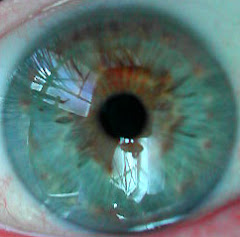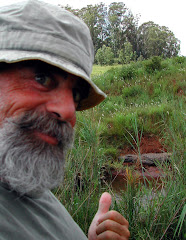.jpg)
A NOTE ON HABITAT aMan Bloom June 2009
Think of habitat, the one you live in or some other, as if it were an elegantly-complex chronograph, that it you remove a part or two, it wouldn’t work quite the same…
Since habitats in nature are organic, they can respond to pressure by adapting and changing. Which takes time. Once, 90% of earth’s creatures went quickly extinct and the remainders eventually resulted in the present configuration of animals, insects, fungi and plants, the ones of our familiarity.
Now, imagine that something removes the urban mongoose or raccoon from the equation. Many people think of these as noisome pests, interfering with gardens, garbage and general demeanor. Take them away, though, and there might be an upsurge of mice and of crickets. The problems of mice are known, but crickets? We don’t know what might happen if there were more crickets, but whatever it might be, there would be a secondary effect, and a tertiary… As the habitat adjusts to the changes… Perhaps the cricket bounty might attract…cobras?
Some people keep cobras to control rodents in their homes. Rather one silent danger than a host of noisome pests. Perhaps well-fed cobras tend to be less dangerous to people? Or, they, the people and the cobras, also adapt.
Point being, the net effect of an early form of industry, domestication –- for example, the bovine problem (cost in water, methane, topsoil depletion, rainforest removal), — is yet unsampled. Except that too many goats did sterilize much of Greece and the Sahara keeps growing westerly…
Let’s say we put the front door of your house on the second floor. Life gets a bit harder. You still get in and out, but getting in and out is both less easy and more dangerous.
Or imagine that you don’t have upper teeth anymore. Still can eat, but…
This is what shitting in water, making electricity from coal, using fossil fuel to run cars, making everything from plastic, growing domestic animals for food and clothing, eventually lead to. Habitat has changed and will adapt to industry. Over time. Whether it supports the creatures and plants that it currently contains, including the humans, is problematic. ‘Nature doesn’t get mad; she gets even,’ the saying goes.
Homeostasis. Habitats are balanced environments perpetually seeking balance. Their front doors will always end up on the ground floor, regardless who lives inside.
A lack of homeostasis in an organic being is what we call ‘disease’.
Momentum. Civilization is like the Exxon Valdez, the giant oil tanker that lost its drunken way in Alaska some years ago. From Slow Go (through the straits) to (uh-oh!) Full Stop takes 15 kilometers (7 miles), skidding along the waterway. Slowing down civilization, just slow enough so that reasonable decisions could be made in its pursuit, is our present challenge.
Some Native American cultures planned seven generations into their future.
Priorities. These require probity when seeking efficiency; understanding as well as sustainability. Sustenance instead of growth. Conservation as well as innovation. Conscious awareness replacing profit. Separating what we need from what we want. Prosperity at the river’s bank. Substituting joy for pleasure…
Habitat is Home.
Think of habitat, the one you live in or some other, as if it were an elegantly-complex chronograph, that it you remove a part or two, it wouldn’t work quite the same…
Since habitats in nature are organic, they can respond to pressure by adapting and changing. Which takes time. Once, 90% of earth’s creatures went quickly extinct and the remainders eventually resulted in the present configuration of animals, insects, fungi and plants, the ones of our familiarity.
Now, imagine that something removes the urban mongoose or raccoon from the equation. Many people think of these as noisome pests, interfering with gardens, garbage and general demeanor. Take them away, though, and there might be an upsurge of mice and of crickets. The problems of mice are known, but crickets? We don’t know what might happen if there were more crickets, but whatever it might be, there would be a secondary effect, and a tertiary… As the habitat adjusts to the changes… Perhaps the cricket bounty might attract…cobras?
Some people keep cobras to control rodents in their homes. Rather one silent danger than a host of noisome pests. Perhaps well-fed cobras tend to be less dangerous to people? Or, they, the people and the cobras, also adapt.
Point being, the net effect of an early form of industry, domestication –- for example, the bovine problem (cost in water, methane, topsoil depletion, rainforest removal), — is yet unsampled. Except that too many goats did sterilize much of Greece and the Sahara keeps growing westerly…
Let’s say we put the front door of your house on the second floor. Life gets a bit harder. You still get in and out, but getting in and out is both less easy and more dangerous.
Or imagine that you don’t have upper teeth anymore. Still can eat, but…
This is what shitting in water, making electricity from coal, using fossil fuel to run cars, making everything from plastic, growing domestic animals for food and clothing, eventually lead to. Habitat has changed and will adapt to industry. Over time. Whether it supports the creatures and plants that it currently contains, including the humans, is problematic. ‘Nature doesn’t get mad; she gets even,’ the saying goes.
Homeostasis. Habitats are balanced environments perpetually seeking balance. Their front doors will always end up on the ground floor, regardless who lives inside.
A lack of homeostasis in an organic being is what we call ‘disease’.
Momentum. Civilization is like the Exxon Valdez, the giant oil tanker that lost its drunken way in Alaska some years ago. From Slow Go (through the straits) to (uh-oh!) Full Stop takes 15 kilometers (7 miles), skidding along the waterway. Slowing down civilization, just slow enough so that reasonable decisions could be made in its pursuit, is our present challenge.
Some Native American cultures planned seven generations into their future.
Priorities. These require probity when seeking efficiency; understanding as well as sustainability. Sustenance instead of growth. Conservation as well as innovation. Conscious awareness replacing profit. Separating what we need from what we want. Prosperity at the river’s bank. Substituting joy for pleasure…
Habitat is Home.






This is what shitting in water, making electricity from coal, using fossil fuel to run cars, making everything from plastic, growing domestic animals for food and clothing, eventually lead to. Habitat has changed and will adapt to industry. Over time. Whether it supports the creatures and plants that it currently contains, including the humans, is problematic. ‘Nature doesn’t get mad; she gets even,’ the saying goes. ~ No truer words have ever been spoken kind sir. ;)
ReplyDeleteamen aMan. breaking for the vac but then back in rehearsal from the twelfth. mid week better chance of catching a run, but welcome anytime. love. andrew the buffalo
ReplyDelete